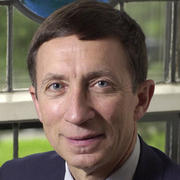
William A. Graham, former HDS Dean and Murray A. Albertson Research Professor of Middle Eastern Studies (FAS), delivered the following remarks at Morning Prayers in Harvard's Memorial Church on February 20, 2019.
♦♦♦
The closing lines of Robinson Jeffers’ poem, “The Answer”:
. . . Integrity is wholeness, / the greatest beauty is / Organic wholeness, the wholeness of life and things, the divine / beauty of the universe. Love that, not man / apart from that, or else you will share man's pitiful confusions, / or drown in despair when his days darken.
For seven decades now, since I first camped under the stars with my father as a five-year-old, all the outdoor opportunities I have had—in the wilderness, on the sea, and above all in mountains around the globe—have been for me defining experiences of the world in its fullest manifestations, well beyond the circumscribed sphere of settled human life and its “civilized” rhythms. The political, social, cultural, religious, and intellectual traditions of “civilization” are our human heritage, but not finally our most fundamental ground of experience or being; that ground instead is Nature writ large—the physical universe from the dirt and grass under our feet to the most distant stars in the heavens above us. It is getting ever harder to realize this grounding of our being in the natural world, but it desperately needs recognition in the face of our accelerating degradation of planet earth itself.
The global history of religion testifies again and again to the powerful roles that the wonders and, yes, terrors of nature have played in our shared human experience, giving rise to some of the oldest spiritual and aesthetic intuitions as well as the deepest emotional responses of our species. All of these support the enduring conviction that the natural world is not just the tangible realm our senses perceive, but a reality revelatory of that which transcends our physical universe and our fragile existence as mortal beings in perilous passage through a world vastly larger than ourselves or even our imagining.
A well-known religious and cultural notion, especially pronounced in monotheistic and humanistic traditions, is that of the "book of nature" as a source of divine revelations analogous to verbal revelations in the "book of scripture." Emerson expresses this well: "Nature is a language and every new fact that we learn is a new word; but rightly seen, taken all together it is not merely a language but the language put together into a most significant and universal book." In Western culture, this “book of nature” idea is of course an old one: Ernst Curtius famously traced its history to the Middle Ages, and even to Plotinus, who said that his art was "to read the written characters of Nature. . . .”
Another vivid example of the "book of nature" as analogous to the "book of scripture" is found in the Muslim Qur’ān. The word used for the verses of the Qur’ānic text, āyāt, is the same word used for God’s “signs” (āyāt) in the natural world: God's revelatory activity is found in his tangible āyāt in Nature as well as his verbal āyāt in scripture. The Qur’an also portrays all of God's creation as naturally engaged in perpetual praise of Him: birds on the wing; rain after drought; wind on the sea; the alternation of day and night; —even the shadows of trees that prostrate themselves in lengthening shadows on the ground in the low light of dawn and sunset—all of nature worships the Creator, setting the pattern for human worship.
Such religious examples posit a divine source of Nature’s revelatory power, but it is also the case that without reference to God at all, a perceptive natural scientist can marvel at what nature "reveals" to the careful investigator. Witness the almost reverent words of E. O. Wilson, who says, “We took a wrong turn when we launched the Neolithic revolution. We have been trying ever since to ascend from rather than to Nature. It is not too late for us to come around, without losing the quality of life already gained, in order to receive the deeply fulfilling beneficence of humanity's natural heritage.” Wilson's "deeply fulfilling beneficence" is what the religiously sensitive might perceive as more than Nature's gift alone. It recalls Schweitzer's “Reverence for Life,” Ehrfurcht vor dem Leben, a religiously grounded ethic that sees all life-forms as God-given and thus worthy of (and requiring) our reverence. It is also not far from the “intimations of immortality” catalogued in Wordsworth’s celebrated “Ode”.
These few examples of the centrality of Nature as the crucible for our deepest religious, aesthetic, and scientific thinking stand over against the looming fact of global climate change that is arguably the paramount threat not only to human life but to all life on earth. Since we alone are the trustees for the natural world, and it is we alone who have brought its survival into question, this is peculiarly our challenge. As we search for ways to make the urgency of dealing with it compelling to the citizens of our own and every other society, we will need to draw upon our diverse but also shared human heritage, both religious and secular—the heritage of reverence and care for the natural world that we inhabit. If we are unable to do this in the grim political battle for preservation of this world, we shall have little compelling moral ground to stand on before it is too late (and the tipping point is nearer than we think).
